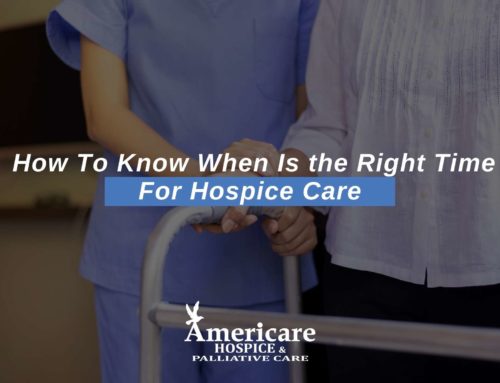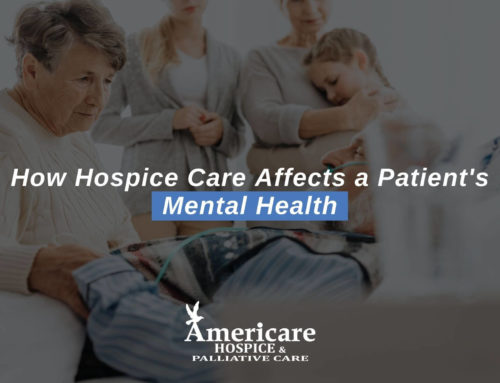If You Support (Physician Assisted) Suicide, Ask Yourself These Three Questions
by Bobi Martinez
Catholic Mission Coordinator, Americare Catholic Hospice
Certified Grief Recovery Specialist
Our society is slowly but surely moving further away from God and the acknowledgement that He is in control and among all else knows when we are most ready to leave this earth according to His most holy will (CCC 2258). Rather, we increasingly see people with little to no faith fearful as they face suffering – especially a terminal illness, terminal prognosis of a loved one, or in moments of despair. So when there is no foundation in a belief of life beyond this earth or a doubt that God is eternally present to us in our suffering, one can easily and naturally as a human being desire to have what anyone in their position would likely want at a moment like that… to take over complete control. And that is where people can find themselves when faith and morals are not a central part of their lives. That said, however, even faithful Christians in despair can understandably find themselves in a similar state of mind. And increasing, disabling fear can become the driving factor of that desired control – all the what ifs and fears of what lies ahead and what pain will come, who will be burdened by them, and no solution or remedy in sight can ultimately result in being tempted to control everything moving forward, including their very time and manner of death – a futile attempt to prevent more anticipated suffering of themselves and of their friends and family. Yet, I have yet to meet a friend or family member who truly seemed at peace or without further suffering after a loved one has committed suicide – assisted or not.

But if you believe there are circumstances that allow for assisted suicide and that it is sometimes an acceptable plan of action – perhaps an even honorable and/or admirable choice, I challenge you to honestly ask yourself and reflect on the following three questions.
1-Do You Believe Any And All Suffering Is Useless?
Many people view any suffering as something to be prevented, avoided, remedied, or destroyed at all costs. They are never able to see meaning, purpose or greater good from any suffering. If this includes you, consider times in your own life when you have suffered: the loss of a job, loss of a relationship, loss of trust, loss of health, loss of faith… I encourage you to take the opportunity to look back and see how you grew through that experience or how others were compelled to serve or love you. Did you return to your faith more? Pray more? Become closer to friends and/or family? Become more grateful for the little things? Realize things you hadn’t before the suffering? Offer it up for a special intention or person? I don’t like to reference the Covid crisis too often to make a point, but given all the negative consequences that have happened as a result of the past 1+ year, have you taken a moment to look at some positives that have also erupted in the wake of that suffering? Some parents realized the value in spending more time with their children, some became more involved in their kids’ education; some people realized they needed to refocus their lives on faith, family, their own wellbeing, etc. Some saw suffering and were compelled to act, to serve, to step forward for the benefit of others. Frankly, we saw firsthand that suffering can lead to growth and love of others that otherwise would not have occurred. But others were sadly unable to see hope or worth in theirs and others’ suffering, and we saw a record breaking spike in suicides of beloved young people, family, and community members. For these souls, suffering only equaled indefinite desperation, trauma and isolation…a state of pain in which a suffering person is most tempted to take over control of their future and reject God’s greatest gift as the only solution – their very lives. Take a moment to think of how you have handled your own suffering in the last few years in this light.
2-Can You Cite In Scripture Or Sacred Tradition Where It States We Can Or Should Take Over Complete Control If We Don’t Understand Or Like What Appears To Be God’s Will For Us In Our Current Situation?
I have found it interesting over the years how some fellow Christians have said things to me I believe are a result of the melding of a morally relativistic society and lack of proper formation in faith. These include statements such as, “God just wants me to be happy” and “If I trust in Jesus and go to Church and be a good person, He will reward me with success and happiness and prosperity.” I am not declaring I believe God wills us to just suffer and not enjoy some prosperity and joy in our lives, but it would seem that the more consistent and Christian message we are faced with resembles the following, “Take up your cross and follow me,” “Be not afraid,” “Jesus wept (JESUS cried in a moment of suffering!),” “There is no greater love than this: to lay down one’s life for another.” Jesus didn’t promise anyone an easy life, but He did promise us eternal life and that He would be with us always and never leave us. Our own Blessed Mother is a pure example of saying yes to God’s will, no matter what she was asked to endure…The Blessed Mother, the Mother of God herself, suffered greatly. Think about that for a moment. If anyone on earth should get a pass on suffering, the ability to dodge it and control her own fate, it should have been Mary. Yet, she was asked to be a young, unwed mother, to give birth outside in a rough, untidy setting, to have to flee her home to Egypt under threat of violence to her and her newborn Son, to watch her only Son be arrested, tortured severely, and crucified to death in a mocking, horrible fashion. She held His lifeless body in her arms, persevering in her faith in God’s will despite her pain. We take for granted now looking back that she just knew what was going to happen…But she had no assuredness except her faith in God and what the angel Gabriel told her: “The Lord is with you…fear not.” Well, the Lord is with YOU, also. Do you believe it, especially when you suffer? And if you do, how does that change your view on what is appropriate to do in your own life and what is to be left to God?
3-Do You Believe Suicide Hurts Others? If So, Why Would You Ever Approve Of It?
There seems to have become an established societal distinction many people blindly accept that assisted suicide is not the same as ‘regular suicide,’ that somehow it’s less painful to those left behind. I have read articles and watched news stories where those planning their deaths threw goodbye parties and were lauded and put on pedestals for their ‘bravery, love and concern for their families, and self awareness to know when they should die and do it so well on their own terms…’ However, this version of portraying assisted suicide as somehow admirable vs tragic and painful has gaping flaws. First, assisted suicide is still suicide. Someone still dies unnaturally, and it is still painful and tragic for those left behind. But in this case, at least one other person has been implicated in carrying it out as well. This is a horrible, moral burden to carry for many people that follows them in the aftermath…the physician, the pharmacist, the family member who was asked to ‘finish the job’ in case the plan fails at first, etc. In addition, Christians believe that ‘God works in mysterious ways’ and that perhaps by taking over control from God you prevent impacting another soul that was God’s will for you and for them. For example, I know many years ago when I worked in a crisis pregnancy center, I counseled a young separated woman who had a toddler, was a pre med student, and became unexpectedly pregnant by her still husband at the time. Her family and friends all told her she was becoming a single mom, had a toddler, was trying to finish her last year of pre med in college, and she couldn’t handle bringing a newborn into the mix. She needed to have an abortion. That was her only option. The suffering would be too much… In short, she had tried 3 times to make an appointment and they all for various weird reasons didn’t pan out. There she sat before me. I am happy to report several months later, I held a precious baby girl in my arms and her mom graduated pre med school soon after. Her family now enthralled with this precious little one forgot how they had not long before encouraged her to avoid more suffering by assisting in the death of her now newborn daughter. She returned to also share with me how when we had chatted months prior in that desperate moment about how God works in our lives and in our suffering without our knowing until later sometimes, it happened. She was approached at the end of the semester by another female pre med student. This fellow student, whom she did not know, told her how much she admired her and wanted to thank her. She said I found out I was pregnant this year and thought there was no way I could do all this with a baby too…but then I saw you…and watched you excel and finish with a newborn baby so I suddenly felt if you could do it, so could I. Our actions, and our reaction to suffering, affect others, in ways we often never even know in this lifetime. Think about your own life history…have you lost someone you loved by suicide? Would it have caused less suffering if you knew it was planned beforehand and someone helped? If someone came to you distraught with an unplanned pregnancy, loss of work, serious health issue, or in despair after a breakup, and wanted to die as a way to stop their pain, would you support ending their life in that seemingly hopeless moment and then help carry it out? Likely, you would not. You would probably want to remind them how loved they are, how strong they are, how you will be there to support them, how much they would be missed, etc. Suicide, no matter how it’s packaged, hurts others. And if an attempt to shield others from pain is a reason someone gives for wanting assisted suicide, it’s important to note that that reasoning doesn’t even make statistical sense.
None of this is to make light of immense suffering many face each day. It does not take much effort to locate a physically, mentally, or emotionally suffering person nearby, perhaps ourselves, at this very moment. Suffering can involve terrible pain, depression, anxiety, isolation, and fear that has the capacity to become extremely debilitating. The challenge is how we respond – what attitude and action we take toward ourselves and toward others in those times of immense distress. Is our response to a suffering soul to say jump off that cliff to end your pain…or to affirm his worth and offer him your extended compassionate hand? Note that countless secular studies have shown that those asking for assistance with committing suicide, when offered compassion, pain relief, or proper support instead, more often stop asking for death and want to live again.
Below is a mere dip into some saintly and scriptural quotes to hopefully inspire you to further reflect on suffering and your current attitude toward it. We sometimes forget that the saints were not perfect people. They all suffered in various ways and often endured dark, challenging times of physical and mental affliction. It can perhaps be noted with great hope that it is in these most
dark and challenging of times that the opportunity to more fully imitate Christ and trust in God’s will for them presented itself. The sainthood of these exemplars was forged in those very dark times. Our admiration of them stems from their decision to not choose complete control in spite of God but rather to choose trust and faith in God’s will despite their agony and suffering.
I challenge us all to respond the next time we encounter hardship not with, “Why is God doing this to me?” but rather “Why is God allowing this cross for me?”
(“Be it done to me according to Thy Word.” Luke 1:38)
Guiding Quotes & Scriptural References
“There is nothing more pleasing to God, than to see a soul who patiently and serenely bears whatever crosses it is sent.” (St. Alphonsus Liguori)
“Either He will shield you from suffering, or He will give you unfailing strength to bear it.”
(St. Francis de Sales)
“The devil is like a rabid dog tied to a chain; beyond the length of the chain he cannot see anyone, and you; keep at a distance; if you approach too near, you let yourself be caught. Remember that the devil has only one door by which to enter the soul: the will.” (St. Padre Pio)
“You must believe in truth that whatever God gives or permits it is for your salvation.”
(St. Catherine of Siena)
“He did not say you would not be troubled, you would not be tempted, you would not be distressed; but He did say you would not be overcome.” (St. Jose Maria Escriva)
“If you ever feel distressed during your day – call upon our Lady – just say this simple prayer: ‘Mary, Mother of Jesus, please be a mother to me now.’ I must admit this prayer has never failed me.” (St. Teresa of Calcutta)
“Pain is never permanent.” (St. Teresa of Avila)
“Prayer is the place of refuge for every worry, a foundation for cheerfulness, a source of constant happiness, a protection against sadness.” (St. John Chrysostom)
“Nothing but self-will can separate us from God.” (St. Alphonsus Liguori)
“If you believe what you like in the Gospels and reject what you don’t like, it is not the Gospels you believe, but yourself.” (St. Augustine)
“Apart from the cross, there is no other ladder by which we may get to heaven.”
(St. Rose of Lima)
“God has allowed things in my life for His own Providence and they have broken my heart open to love like Him and I would never come close to loving like Him had those things not happened to me.” (Sr. Miriam James)
“The best way to show my gratitude to God is to accept everything, even my problems, with joy.” (St. Teresa of Calcutta)
“If there be a true way that leads to the Everlasting Kingdom, it is most certainly that of suffering, patiently endured.” (St. Colette)
“I repeat that the temptations of jealousy, desperation, discouragement, distrust, etc. are works of the devil.” (St. Padre Pio)
“You must accept your cross; if you bear it courageously it will carry you to heaven.”
(St. John Vianney)
“Be not afraid.” Proverbs 3:25 (and about 365 other places in scripture…)
“So we do not lose heart. Though our outer nature is wasting away, our inner nature is being renewed every day. For this slight momentary affliction is preparing for us an eternal weight of glory beyond all comparison, because we look not to the things that are seen but to the things that are unseen; for the things that are seen are transient, but the things that are unseen are eternal.” 2 Corinthians 4:16-18
“Be strong and courageous! Do not be afraid and do not panic before them. For the Lord your God will personally go ahead of you. He will neither fail you nor abandon you.”
Deuteronomy 31:6
“And Jesus, passing by, saw a man who was blind from his birth. And His disciples asked him: Rabbi, who hath sinned, this man or his parents that he should be born blind? Jesus answered: Neither hath this man sinned, nor his parents; but that the works of God should be made manifest in him.” John 9:1-3

Americare Hospice and Palliative Care
1212 N. Spencer St., Suite #2
Mesa, Arizona 85203
Office: (480) 726-7773
Fax: (480) 726-7790
Email: info@americarehospice.org





